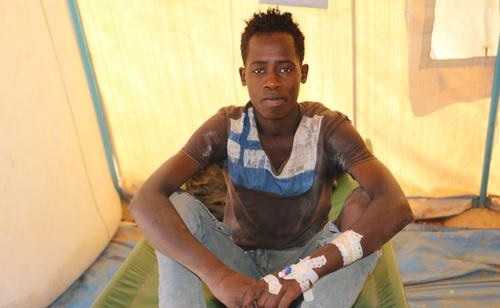
The spread of acute watery diarrhea across Ethiopia in the last year has claimed many lives and affected thousands through severe dehydration. Médecins Sans Frontières (MSF) has been working with the Regional Health Bureau to intervene rapidly in communities suffering from this potentially fatal disease.
(MSF)–Habatamu Abayneh arrived in Kebridehar recently and was supposed to start a new job in construction. But two weeks later, he fell ill with acute watery diarrhea (AWD). When he was brought to the Kebridehar Case Treatment Center (CTC) he was unconscious. The friends who brought him for treatment thought that he might be dying.
“While I was afraid of dying, I especially did not want it to happen so far from home where I am a stranger,” Habatumu explains.
He now sits up comfortably, smiling in his bed in the Kebridehar Case Treatment Center (CTC) managed by MSF in the central Somali Region.
He is steadily recovering from the potentially fatal condition.
“I feel like I have been given a second life by the doctors and nurses here,” he says. “But it’s not just me. My whole family depends on the money I can earn, and without it, I fear they will be destitute.”
Thousands of cases treated
Acute watery diarrhea spreads through bacteria in stools when sanitary conditions and personal hygiene are poor. It can spread quickly with population movements and increase the burden on public health systems.
The symptoms of AWD can include nausea, vomiting and diarrhea. In extreme cases, the loss of fluid can be up to one liter every hour, which can ultimately lead to rapid dehydration and then death, if not treated. Only about one in ten infected people develop the typical signs and symptoms of AWD, usually within a few days of infection.
Fortunately, if given the right treatment, most people make a rapid recovery.
Speed is the key to treatment
Since March 2016, thousands of cases of this communicable disease have been detected and treated in Ethiopia with the full support of the Regional Health Bureau.
MSF first started to treat patients in Gedeo in the Southern Nations, Nationalities and People’s Region state (SNNPR). The disease then further spread to the capital Addis Ababa, the Somali and Oromia Regions.
Read the complete story at Médecins Sans Frontières (MSF) International
——
See also:
- Ethiopia Set to Eliminate Leprosy Related Disability
- Ethiopia: Surviving Hard Times through Therapeutic Foods
- Ethiopia Prioritizes Safe Surgery, Launches National Initiative
- Italy Gives 5 Million Euros Soft Loan for Strengthening Ethiopia’s Health Infrastructure
- Integrated Family Health Program: USAID Support Saved Lives and Improved Family Health
